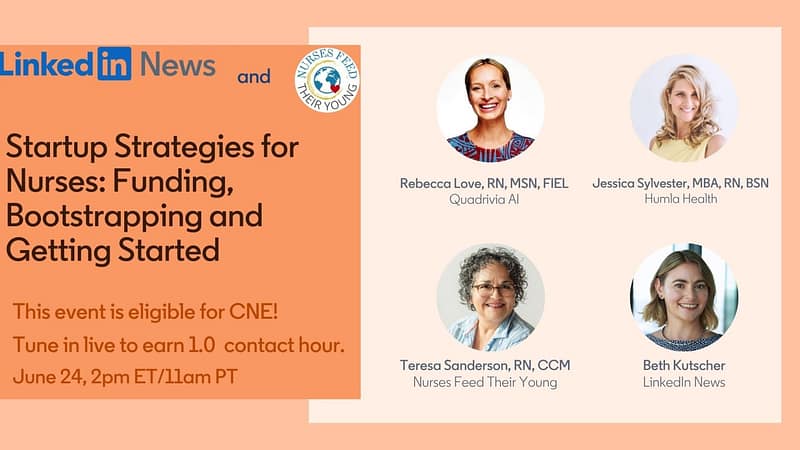
Beth Kutscher
Editor at Large at LinkedIn News
June 18, 2025
For more tips on bringing your business idea to reality, check out our CEU eligible webinar next week in partnership with Nurses Feed Their Young.
Click the image above to register
Over the course of her career, Toni Land, MBA, BSN, CPXP, LCC has applied her nursing knowledge at the bedside, in hospital leadership, and in the corporate world. And a few years ago, she took another leap of faith — to start her own business.
Land’s specialty is in improving patient experience, and in 2022, she decided to launch her own consulting business, Landing Exceptional Experiences.
“I had a vision,” she told me. “And I wanted the freedom to be able to do that outside of some of the constraints that a lot of times you get when you’re in the system.”
Land, a self-described solopreneur, is one of the growing number of self-employed nurses on LinkedIn. Between 2022 and 2024, the number of nurses who listed themselves as self-employed on their profiles increased 46%, and they now comprise 3.2% of nurses on the site, according to our data analysis.
The uptick also comes amid anecdotal evidence of a spike in nurse entrepreneurship.
In a sign of the times, Nurse Capital— the first nurse-led venture capital firm that invests nurse entrepreneurs — closed its inaugural $1 million fund last June.
The firm didn’t know what to expect when it started looking for funding opportunities, but general partner Beth A. Brooks, PhD, RN, FACHE noted that she was “thrilled” to receive 25 pitch decks. The firm made its first two investments last November in Wave Therapeutics, which makes AI-enabled cushioning technology to prevent and treat pressure injuries, and the The Nursing Beat, which publishes a digital newsletter.
It’s still early days, Brooks acknowledges. Its database includes around 80 entrepreneurs, the vast majority of whom are only a few years into their entrepreneurial journey.
But, she added, “It’s this new, whole fever in healthcare investing.”
I actually met Brooks at the American Organization for Nursing Leadership (AONL) conference, at the event’s Nurse Innovator Showcase. While the showcase was a first for the AONL, that sort of programming is increasingly common both at health-tech and nursing conferences.
The interest comes as nurses continue to seek flexibility from their careers — and not necessarily finding it from their employers. Travel jobs, meanwhile, have dried up, even as nurses still value control over their schedules. As many as 38% of nurses who responded to a LinkedIn survey earlier this year said a more flexible work location would motivate them to take a new job, compared with 23% of other clinicians.
“Anecdotally, the evidence suggests that nurses are pursuing entrepreneurship to achieve greater autonomy,” said Dr. Lendra James DNP, MS, RN, NE-BC, a nurse who started her own consulting business to help nurses facing burnout. She estimates that up to 80% of nurses who seek her out are looking to start their own business, and she now hosts a Health & Wealth Expo that covers topics such as how to monetize your expertise.
“Establishing their own business allows nurses to have more control over their environment and their practices,” James said. “And then it also helps them to address unmet needs so they can develop services and products that fill gaps that have been identified in patient care.”
Getting started
It’s often said that nurses are natural innovators — but those who’ve made the move to entrepreneurship offer the same advice: you need to know the business and you need to find an unmet need in the market.
Understanding how the pieces of the healthcare system fit together is key to launching a successful venture, said Marie Adeniyi, RN, MSN, MHA, the founder of HealthChex. Nursing was actually her second career after getting a degree in business and finance, and she soon became the go-to person for figuring out workflows and collecting data. She was also mentoring nurses on how to do the same.
The idea for HealthChex — which serves as a third-party vendor helping health systems implement new technologies — came after she started getting calls from a former employer, and taking time off from her regular job to consult for them.
“As I did that more and more, I said, this is a need in the market,” she told me. “Why don’t I bring nurses and people in healthcare under this HealthChex umbrella and teach them what I know? Then when the need arises, instead of me going, I am facilitating that engagement.”
Yet a business degree isn’t a prerequisite to starting a business, she said. Mentors and coaches can help nurses develop the skills they need.
Land, for instance, describes herself as a natural leader, but she needed to learn sales and marketing to sell her services to clients.
“Talking to people about the work comes naturally for me,” she said. “But what does not is sales, and if you’re an entrepreneur, you do have to sell your business and get contracts. Sales is an art and it doesn’t have to be a pushy, distasteful art.”
Nurse Capital chose its first two portfolio companies after looking for startups that could sustain rapid growth in a big market — with a particular interest in technology, products and devices, and marketplace platforms that facilitate commerce.
The firm plans to start raising additional capital at the end of the summer, Brooks said, adding that it evaluates opportunities the way any traditional VC would.
“Put your business hat on, front and center,” she advised. “Just because you’re pitching to a nurse, you shouldn’t assume that we know the clinical problem.”
